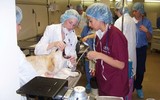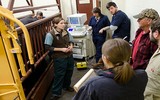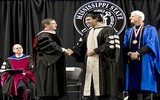Mississippi State University - College of Veterinary Medicine

The Mississippi State University College of Veterinary Medicine captures a unique balance of world class research in animal and public health, high quality learning experiences and cutting edge medical care, all with a family-like atmosphere. Mississippi State graduates excel in their careers, whether that path leads to a small town practice, research laboratory or an international program. Our faculty are national and international leaders in their fields and are committed to providing excellent veterinary education, advancing research in veterinary medicine and biomedical fields and serving the community through cutting edge diagnostics, clinical care and shared learning.
Prospective Students

The Mississippi State University College of Veterinary Medicine invites you to become part of our family. Our innovative DVM curriculum of two years of pre-clinical (classroom and laboratory) coursework and two years of clinical education (practical application) provides students with a broad-based foundation in veterinary medicine and allows them to pursue focused career interests through externships, research and elective clinical rotations.
We have one of only 15 NIH funded summer research experiences. The Summer Research Experience is a 12-week program with a purpose to provide student trainees with exposure and training in biomedical research and to provide them with skills that will help them grow into leaders in the veterinary profession.
Our graduate study programs allow students to pursue a master's or doctorate with a specialty in infectious diseases, toxicology, pharmacology, pathology or production medicine.
The MSU-CVM also has a bachelor's degree program in veterinary medical technology. This degree prepares students for careers ranging from private practice to cutting-edge biomedical research.
Degree Programs & Research
Doctor of Veterinary Medicine (DVM)
Early Entry Program

The application for the Early Entry Program is available to high school seniors October 1 through December 31 each year and is due for submission January 5 of the applicant's senior year.
What is the Early Entry Program?
The Early Entry Program is a unique program of the College of Veterinary Medicine (CVM) that allows high-achieving high school seniors to earn pre-acceptance (early, pre-approved acceptance) into the CVM.
How does the Early Entry Program (EEP) work?

Students who have an interest in veterinary medicine and meet application requirements during high school may apply for the Early Entry Program. If a student is accepted into this program, he/she begins undergraduate work at MSU after high school graduation and completes the first three to four years of prerequisite courses, while also working toward completion of a bachelor's degree. After the student has completed all course requirements for the College of Veterinary Medicine, has remained in good standing and has taken the GRER General Exam, he/she matriculates into the CVM as a pre-accepted student. The student does not make further application to the CVM.
What must a student do to remain in good standing in the Early Entry Program?
 Successfully complete a minimum 14 credit hours per semester at MSU.
Successfully complete a minimum 14 credit hours per semester at MSU.
- Earn no less than a 3.35 GPA in:
- all college courses combined (cumulative/overall GPA)
- all prerequisite math/science courses (math/science GPA)
- all other prerequisite courses (required course GPA)
- the last 45 semester hours of college (last 45 GPA)
- Remain in good standing with the university
- Meet with the Early Entry Program administrator at least once each semester
- Document at least 480 hours' work experience in a veterinary clinical/scientific setting prior to matriculation to the DVM program
What are my degree options within the EEP?

Students in the EEP may choose any major of study, however the following programs have degree requirements that align with requirements for admission to the College of Veterinary Medicine.
- Animal & Dairy Science
- Biochemistry
- Biological Engineering
- Biological Sciences
- Chemical Engineering
- Food Science Technology
- Poultry Science
- Wildlife Science
What are the Application Requirements for the EEP?
 Students applying for this program must have the following qualifications:
Students applying for this program must have the following qualifications:
- ACT composite score of 27 (SAT score of 1820 on new SAT); and
- High school grade average of 90. (3.6 on a 4.0 scale)
In addition, the Early Entry Program Admissions Committee considers animal and veterinary experience, work experience, leadership qualities and nontechnical skills and aptitudes (character, community service, etc.) as described in the applicant's written application to the Early Entry Program and in the applicant's letters of recommendation (provided in the application).
How many students are accepted each year?
Typically, twenty-five positions are available each year. We normally receive 50 to 75 applications.Are there other conditions for acceptance into the Early Entry Program?
 Each Early Entry student must also be accepted to Mississippi State University. Applications to the Early Entry Program and the university are separate applications.
Each Early Entry student must also be accepted to Mississippi State University. Applications to the Early Entry Program and the university are separate applications.
Does the EEP accept out-of-state students?
Yes. Both Mississippi and out-of-state students are eligible for the program.When are applications available?
 Applications for the Early Entry Program are available by October 1 each year and are due for return by January 5. Applicants are notified of acceptance status in February.
Applications for the Early Entry Program are available by October 1 each year and are due for return by January 5. Applicants are notified of acceptance status in February.
How do I get an application?
Applications are available online from October 1 through December 31 each year.- Early Entry Program Applications Instructions
- Early Entry Program Application
- Confidential Evaluation Form
- Confidential Evaluation Instructions
Student Admissions

NOTE: The academic year at MSU-CVM for first-year students begins around July 1st. In order for an applicant to be considered for admission, all prerequisite courses must be completed by the end of the spring semester prior to matriculation to MSU-CVM.
To be considered for admission, in addition to meeting all academic, testing and deadline requirements, an applicant must be in good standing at his/her current university, as well as at all colleges or universities he/she has attended. A student who has been dismissed from another college of veterinary medicine cannot be considered for admission to MSU-CVM.
A DVM degree by itself may not entitle an individual to legally practice veterinary medicine. An individual should check the requirements of the state he/she wishes to practice in to determine if the North American Veterinary Licensure Examination and/or a state exam is required for legally practicing veterinary medicine.
Combined DVM-Graduate Degree Programs

A student in our DVM professional curriculum can simultaneously pursue the MS or PhD degree while working toward completion of the DVM degree. Students wishing to pursue the DVM and a graduate degree simultaneously are carefully screened for admission because of the rigorous requirements and time commitments necessary to work on two degrees simultaneously. Eighteen hours of graduate credit course work can be used as electives for the DVM degree. For general information regarding graduate education in the college click here.
DVM-MS

A student wishing to obtain a MS while working on his/her DVM degree must be officially admitted to the MSU Graduate School. Students seeking a MS degree can choose a thesis or non-thesis option. Credit hour requirements for either option range from 35 to 40 hours. A student choosing the thesis option must complete and defend a research project as part of his/her comprehensive final exam. Students in the non-thesis option must take a qualifying exam and a final comprehensive exam. A student could be awarded the MS degree at the same time he/she receives the DVM. In some cases the MS degree is awarded 6 to 9 months after the DVM degree has been awarded. Students pursuing the MS degree in Veterinary Medical Sciences can emphasize or focus on a commodity (beef, dairy, poultry, aquaculture) or specialize in a scientific discipline such as bacteriology, parasitology, virology, immunology, bioinformatics or epidemiology, to name a few.
DVM-PhD

The simultaneous pursuit of a DVM and PhD degree requires a highly motivated student who can handle a rigorous course load. Students seeking admission to this program go through a two-step interview process. The student is interviewed for admission into the DVM professional education program and the graduate program of the college. A student admitted to the DVM-PhD program takes graduate coursework and after two years begins the DVM professional education curriculum. Completion of the DVM-PhD program will require at least 7 years in most cases; however, this is shorter in time by 1 to 2 years than if the degrees were pursued separately.
 Contact Us: 240 Wise Center Drive
P.O. Box 6100
Mississippi State, MS 39762
Contact Us: 240 Wise Center Drive
P.O. Box 6100
Mississippi State, MS 39762Phone: 662-325-9065 or 662-325-2749
Fax: 601-709-0078
Mail: hadaway@cvm.msstate.edu
Site: http://cvm.msstate.edu/
